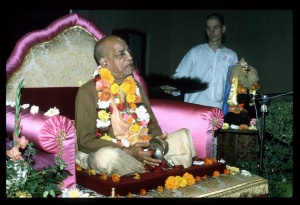CC Madhya 19.74 (1975): Difference between revisions
(Vanibot #0027: CCMirror - Mirror CC's 1996 edition to form a basis for 1975) |
(Vanibot #0020: VersionCompareLinker - added a link to the Version Compare feature) |
||
| Line 2: | Line 2: | ||
<div style="float:left">'''[[Sri Caitanya-caritamrta (1975)|Śrī Caitanya-caritāmṛta (1975)]] - [[CC Madhya (1975)|Madhya-līlā]] - [[CC Madhya 19 (1975)|Chapter 19: Lord Śrī Caitanya Mahāprabhu Instructs Śrīla Rūpa Gosvāmī]]'''</div> | <div style="float:left">'''[[Sri Caitanya-caritamrta (1975)|Śrī Caitanya-caritāmṛta (1975)]] - [[CC Madhya (1975)|Madhya-līlā]] - [[CC Madhya 19 (1975)|Chapter 19: Lord Śrī Caitanya Mahāprabhu Instructs Śrīla Rūpa Gosvāmī]]'''</div> | ||
<div style="float:right">[[File:Go-previous.png|link=CC Madhya 19.73 (1975)|Madhya-līlā 19.73]] '''[[CC Madhya 19.73 (1975)|Madhya-līlā 19.73]] - [[CC Madhya 19.75 (1975)|Madhya-līlā 19.75]]''' [[File:Go-next.png|link=CC Madhya 19.75 (1975)|Madhya-līlā 19.75]]</div> | <div style="float:right">[[File:Go-previous.png|link=CC Madhya 19.73 (1975)|Madhya-līlā 19.73]] '''[[CC Madhya 19.73 (1975)|Madhya-līlā 19.73]] - [[CC Madhya 19.75 (1975)|Madhya-līlā 19.75]]''' [[File:Go-next.png|link=CC Madhya 19.75 (1975)|Madhya-līlā 19.75]]</div> | ||
{{CompareVersions|CC|Madhya 19.74|CC 1975|CC 1996}} | |||
{{RandomImage}} | {{RandomImage}} | ||
==== TEXT 74 ==== | ==== TEXT 74 ==== | ||
| Line 12: | Line 11: | ||
:śuciḥ sad-bhakti-dīptāgni- | :śuciḥ sad-bhakti-dīptāgni- | ||
:dagdha-durjāti-kalmaṣaḥ | :dagdha-durjāti-kalmaṣaḥ | ||
: | :śvapāko 'pi budhaiḥ ślāgyo | ||
:na | :na vedajño 'pi nāstikaḥ | ||
</div> | </div> | ||
| Line 20: | Line 19: | ||
<div class="synonyms"> | <div class="synonyms"> | ||
śuciḥ—a brāhmaṇa purified internally and externally; sat-bhakti—of devotional service without motives; dīpta-agni—by the blazing fire; dagdha—burnt to ashes; durjāti—such as birth in a low family; kalmaṣaḥ—whose sinful reactions; śva-pākaḥ api—even though born in a family of dog-eaters; budhaiḥ—by learned scholars; | śuciḥ—a brāhmaṇa purified internally and externally; sat-bhakti—of devotional service without motives; dīpta-agni—by the blazing fire; dagdha—burnt to ashes; durjāti—such as birth in a low family; kalmaṣaḥ—whose sinful reactions; śva-pākaḥ api—even though born in a family of dog-eaters; budhaiḥ—by learned scholars; ślāgyaḥ—recognized; na—not; veda-jñaḥ api—even though completely conversant in Vedic knowledge; nāstikaḥ—an atheist. | ||
</div> | </div> | ||
| Line 27: | Line 26: | ||
<div class="translation"> | <div class="translation"> | ||
Śrī Caitanya Mahāprabhu said, | Śrī Caitanya Mahāprabhu said, " 'A person who has the pure characteristics of a brāhmaṇa due to devotional service, which is like a blazing fire burning to ashes all the sinful reactions of past lives, is certainly saved from the consequences of sinful acts, such as taking birth in a lower family. Even though he may be born in a family of dog-eaters, he is recognized by learned scholars. However, although a person may be a learned scholar in Vedic knowledge, he is not recognized if he is an atheist. | ||
</div> | </div> | ||
| Line 34: | Line 33: | ||
<div class="purport"> | <div class="purport"> | ||
This verse and the next are quoted from the Hari-bhakti-sudhodaya (3.11, 12), a transcendental literature extracted from the Purāṇas. | This verse and the next are quoted from the Hari-bhakti-sudhodaya (3.11,12), a transcendental literature extracted from the Purāṇas. | ||
</div> | </div> | ||
Latest revision as of 12:14, 27 January 2020

A.C. Bhaktivedanta Swami Prabhupada
TEXT 74
- śuciḥ sad-bhakti-dīptāgni-
- dagdha-durjāti-kalmaṣaḥ
- śvapāko 'pi budhaiḥ ślāgyo
- na vedajño 'pi nāstikaḥ
SYNONYMS
śuciḥ—a brāhmaṇa purified internally and externally; sat-bhakti—of devotional service without motives; dīpta-agni—by the blazing fire; dagdha—burnt to ashes; durjāti—such as birth in a low family; kalmaṣaḥ—whose sinful reactions; śva-pākaḥ api—even though born in a family of dog-eaters; budhaiḥ—by learned scholars; ślāgyaḥ—recognized; na—not; veda-jñaḥ api—even though completely conversant in Vedic knowledge; nāstikaḥ—an atheist.
TRANSLATION
Śrī Caitanya Mahāprabhu said, " 'A person who has the pure characteristics of a brāhmaṇa due to devotional service, which is like a blazing fire burning to ashes all the sinful reactions of past lives, is certainly saved from the consequences of sinful acts, such as taking birth in a lower family. Even though he may be born in a family of dog-eaters, he is recognized by learned scholars. However, although a person may be a learned scholar in Vedic knowledge, he is not recognized if he is an atheist.
PURPORT
This verse and the next are quoted from the Hari-bhakti-sudhodaya (3.11,12), a transcendental literature extracted from the Purāṇas.